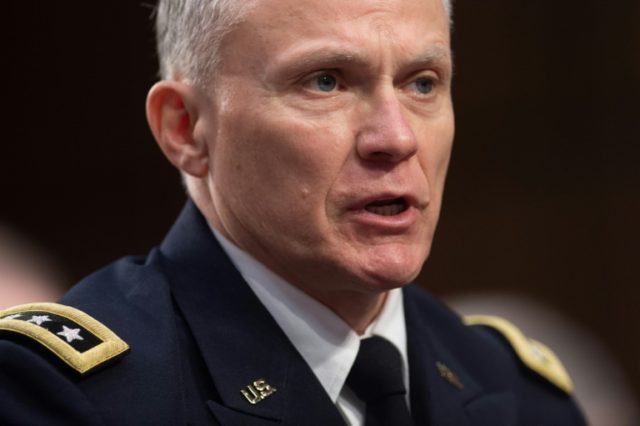U.S. Defense Intelligence Agency Director Lt. Gen. Robert P. Ashley said on Wednesday that Russia has been working on “upgrading the capacity of its nuclear forces” and may be conducting low-yield nuclear weapons tests.
A high-ranking Russian politician blasted Ashley’s comments as “irresponsible” and insisted “nuclear tests cannot be carried out secretly.”
Ashley gave a speech to the Hudson Institute, a Washington-based think tank, in which he discussed Russian and Chinese efforts to modernize their nuclear arsenals.
Ashley said the Defense Intelligence Agency (DIA) has evidence that both adversary nations are working hard to increase their nuclear stockpiles and upgrade their delivery system, with Beijing embarking on the “most rapid expansion and diversification of its nuclear arsenal in China’s history.” He noted China launched more ballistic missiles for testing and training last year than all the other nations of the world combined.
The section of Ashley’s speech dealing with Russia proved more controversial, as he accused Russia of fudging or violating almost every arms-control treaty it has signed and concealing its nuclear buildup from outside observers.
Ashley said the Russians are focused on improving their arsenal of “non-strategic nuclear weapons,” meaning low-yield nuclear warheads that could be deployed on a battlefield using relatively short-range delivery systems. He mentioned the 9M729 ground-launched cruise missile, which the U.S. deemed a violation of the 1987 Intermediate-Range Nuclear Forces Treaty (INF), prompting President Donald Trump to withdraw from the treaty.
Ashley noted the United States has only one non-strategic nuclear weapon, the B-61 gravity bomb, while Russia has up to 2,000 of them. He said the precise number of weapons in the Russian arsenal is difficult to ascertain because Russia is severely lacking in “transparency” and tends to produce nuclear weapons that look identical to non-nuclear variants, making it difficult for observers to distinguish between them.
“From an interagency standpoint, the U.S. has determined Russia’s actions have strained other key pillars of arms control architecture, including the Chemical Weapons Convention, Open Skies Treaty, the Vienna Document, and the Treaty on Conventional Armed Forces in Europe,” he said.
In the crucial passage of his speech, Ashley explained that the American intelligence community does not pass judgment on whether foreign powers are fully complying with treaties, but rather looks for actions that appear “inconsistent” with the behavior mandated by those treaties. Stated bluntly, U.S. intelligence services look for behavior that implies other nations are not taking their treaty obligations seriously, rather than absolute proof the treaties have been violated.
With that in mind, Ashley delivered the assessment that sparked headlines and angered Russia:
Russia’s development of new warhead designs and overall stockpile management efforts have been enhanced by its approach to nuclear testing. The United States believes that Russia probably is not adhering to its nuclear testing moratorium in a manner consistent with the “zero-yield” standard.
Our understanding of nuclear weapon development leads us to believe Russia’s testing activities would help it to improve its nuclear weapons capabilities. The United States, by contrast, has forgone such benefits by upholding a “zero-yield” standard.
Ashley clarified that U.S. intelligence agencies believe Russia preserved the capability to perform low-yield nuclear weapons tests, and Moscow’s stated agenda for upgrading its nuclear forces would require such tests to be conducted, but he did not directly accuse the Russians of performing any such tests to date.
CBS News nevertheless found Ashley’s speech significant as the first time a high-ranking U.S. official has explicitly stated Moscow is not fully observing its commitments under the U.N. Comprehensive Nuclear Test Ban Treaty (CTBT), a document Russia signed in 2000 but the United States did not.
U.S. critics of the CTBT argue its definitions of banned nuclear testing are too vague, giving Russia and China plenty of wiggle room to conduct tests while the U.S. behaved in a more constrained manner. Despite being one of eight nations to refrain from ratifying the CTBT, the U.S. has not conducted a nuclear weapons test since 1992.
The Wall Street Journal reported on Wednesday that other U.S. intelligence agencies concur with Ashley’s assessment and suspect the Russians have been conducting low-yield nuclear tests at facilities in the Arctic Ocean region.
The Kremlin had not officially commented on Ashley’s speech as of Thursday morning, but Vladimir Shamanov, head of the State Duma Defense Committee, was apoplectic in an interview with Russian state media.
“He just could not have made a more irresponsible statement. Nuclear tests cannot be carried out secretly with equipment, which is controlling these processes today,” Shamanov said of Ashley’s remarks.
Shamanov proceeded to insult both Ashley and the U.S. military.
“These kinds of statements reveal that the professionalism of the military is systemically falling in America,” he sneered. “These words of the U.S. intelligence chief indicate that he is an occasional person in this profession and he is in the wrong job.”

COMMENTS
Please let us know if you're having issues with commenting.